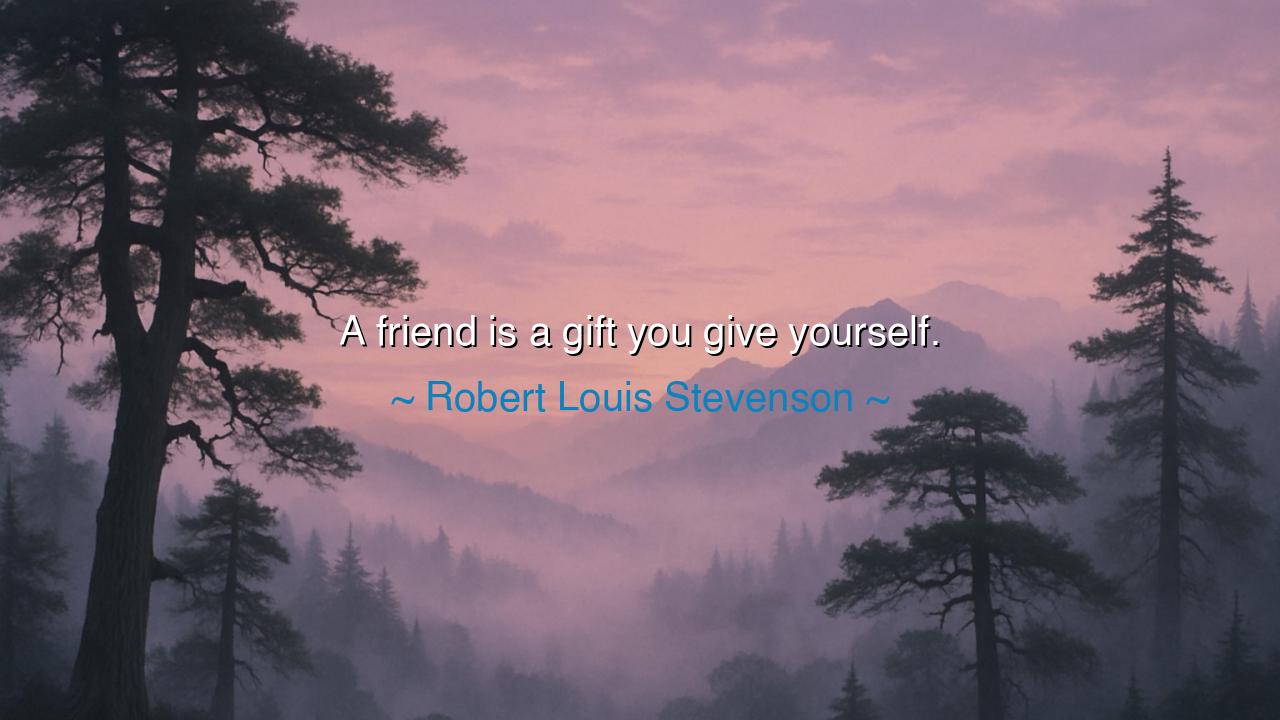
A friend is a gift you give yourself.






“A friend is a gift you give yourself.”
Thus wrote Robert Louis Stevenson, the wanderer, poet, and teller of timeless tales—he who sought the beauty of the human spirit even amid life’s storms. In this brief yet luminous saying, Stevenson unveils a truth both simple and profound: that friendship is not something bestowed by fate or found by accident, but something we create from the generosity of our own hearts. To have a true friend, he tells us, is to have given oneself a gift—one fashioned not of gold or silver, but of trust, affection, and shared humanity.
The origin of this quote can be traced to Stevenson’s reflections on companionship, written during his years of illness and travel. A man who spent much of his life far from home, Stevenson knew loneliness well. His fragile health led him from the fog of Scotland to the sunlit islands of the Pacific, where he discovered both new lands and new loves. In those wanderings, he learned that friendship was not merely company—it was the soul’s reward for openness, kindness, and courage. When he wrote, “A friend is a gift you give yourself,” he was not speaking of possession, but of self-giving—that through love and vulnerability, we awaken the best parts of our own nature.
The meaning of this quote lies in understanding that friendship begins not in another, but in the self. One cannot receive what one is not willing to give. A man filled with bitterness cannot attract joy; one who hides behind pride cannot find understanding. But when a soul chooses to be kind, to listen, to care—to offer itself sincerely—it calls forth another heart that mirrors its own. Thus, in giving friendship, we are, in truth, giving a gift to ourselves, for every act of love expands the soul that gives it. The friend we find in another is the reflection of the friend we have first chosen to be within.
Consider the friendship of Helen Keller and Anne Sullivan, one of the most radiant examples in human history. When Anne entered Helen’s dark and silent world, she gave not advice nor pity, but her patience, her faith, her heart. Through years of struggle, she taught Helen to see not with eyes, but with spirit. Yet as their lives unfolded, Helen herself gave back to Anne an equal gift—gratitude, admiration, and devotion that never wavered. Each woman became the other’s gift: Anne, the guide who illuminated; Helen, the soul who transformed hardship into wisdom. Their friendship proved Stevenson’s truth—that to give love selflessly is to receive it multiplied, to bless another is to bless oneself.
Stevenson’s insight also holds a mirror to our age, where many seek friendship as a balm for emptiness, forgetting that friendship cannot fill a heart closed to giving. To find a true friend, one must first offer truth. To receive loyalty, one must first be loyal. Friendship is the fruit of character, not chance. It grows where sincerity is sown, and withers where self-interest takes root. The greatest friendships—like those of the ancients, forged in honor and trust—are born from mutual respect and nurtured by time. They are the living proof that generosity of spirit returns to the giver as joy, peace, and meaning.
And yet, Stevenson’s words are not merely moral—they are poetic. He likens friendship to a gift because it is something both precious and deliberate. A gift is chosen, not forced; it is wrapped in thoughtfulness and given with the hope of delight. So too must we approach friendship: not as a transaction, but as a sacred offering. When we choose to open our hearts to another, we are, in essence, gifting ourselves with love—a love that will one day return in laughter, memory, and companionship. The friend we gain becomes the mirror of our own best self, and the joy we feel in their presence is the joy of seeing our soul reflected in another form.
Let this, then, be the lesson: if you wish to have friends, become the friend you seek. Be kind where others are harsh; be loyal where others falter; be open where others hide. Do not wait for friendship to come—cultivate it, as a gardener tends his flowers. For every act of care you give, you plant the seed of joy within your own heart. When you love freely, you enrich yourself beyond measure. Remember always that friendship is not a prize, but a gift you give yourself, a circle of giving that begins and ends within the soul.
Thus, the wisdom of Robert Louis Stevenson endures like the gentle flame of a lantern carried through the night: “A friend is a gift you give yourself.” For in choosing to love, we choose to live fully; in giving friendship, we become more human. The truest gifts are not those wrapped in paper, but those wrapped in kindness and constancy. To give such a gift is to know, in the quiet chambers of the heart, that one has found something eternal—a reflection of one’s own soul in another, shining bright and unbroken through the passing of years.






AAdministratorAdministrator
Welcome, honored guests. Please leave a comment, we will respond soon